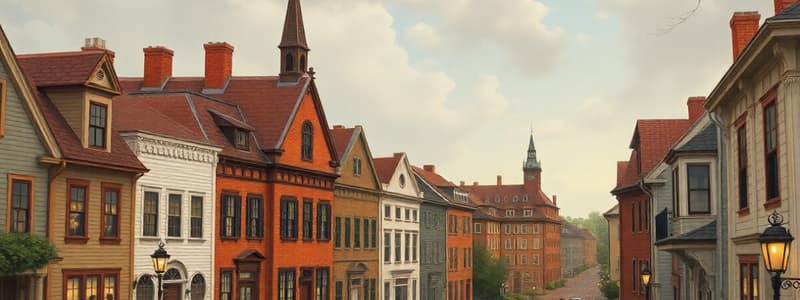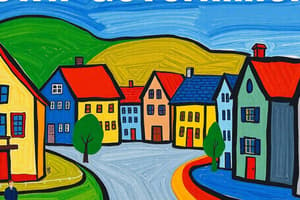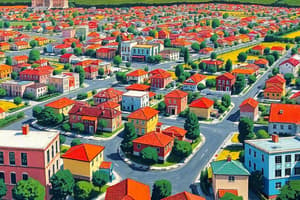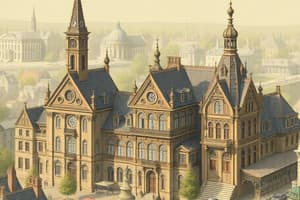Podcast
Questions and Answers
In New England, what role do town governments typically play in relation to counties within the communities?
In New England, what role do town governments typically play in relation to counties within the communities?
- Town governments handle most of the needs of small communities, while counties are mainly judicial districts. (correct)
- Town governments and counties have overlapping responsibilities for all aspects of community governance.
- Town governments focus solely on judicial matters, deferring all other community needs to the county.
- Town governments mainly serve as judicial districts, while counties handle most community needs.
What is the historical significance of the town meeting form of government in New England?
What is the historical significance of the town meeting form of government in New England?
- It is one of the newest forms of government in the United States.
- It was primarily used for electing representatives to the state legislature.
- It was introduced by English colonists in the 18th century.
- It is one of the oldest forms of government in the United States, characterized by direct involvement of citizens. (correct)
What is a key limitation of traditional town meetings?
What is a key limitation of traditional town meetings?
- They are too frequent to allow for effective decision-making.
- They can only be attended by elected representatives.
- They are useful only for broad policy making and not the everyday details of government. (correct)
- They are dominated by selectmen.
What is the role of selectmen in New England town governments?
What is the role of selectmen in New England town governments?
What is the main reason some New England towns have transitioned to representative town meetings?
What is the main reason some New England towns have transitioned to representative town meetings?
How do townships in states like New York, New Jersey, and Pennsylvania differ from towns in New England?
How do townships in states like New York, New Jersey, and Pennsylvania differ from towns in New England?
What was the original intent behind the size and shape of townships during westward expansion?
What was the original intent behind the size and shape of townships during westward expansion?
What distinguishes civil townships established during westward expansion?
What distinguishes civil townships established during westward expansion?
What is the role of a township committee or board of supervisors in most townships?
What is the role of a township committee or board of supervisors in most townships?
Why have townships become less important over time?
Why have townships become less important over time?
In what context might community members choose to establish a village government?
In what context might community members choose to establish a village government?
What characterizes the government of most villages?
What characterizes the government of most villages?
What power does a village board typically possess?
What power does a village board typically possess?
What is often a primary disadvantage of becoming a village?
What is often a primary disadvantage of becoming a village?
What is the typical relationship between villages and other local governments?
What is the typical relationship between villages and other local governments?
Flashcards
Towns/Townships
Towns/Townships
In New England, these are local government units. In the Midwest, they are called townships.
Direct Democracy
Direct Democracy
In early town meetings, citizens made important decisions directly, rather than through elected representatives.
Limitations of Town Meetings
Limitations of Town Meetings
Town meetings are useful for broad policy making, not the everyday details of government.
Selectmen
Selectmen
Signup and view all the flashcards
Representative Town Meetings
Representative Town Meetings
Signup and view all the flashcards
Town Council
Town Council
Signup and view all the flashcards
Township
Township
Signup and view all the flashcards
Civil Townships
Civil Townships
Signup and view all the flashcards
Township Committee
Township Committee
Signup and view all the flashcards
Village Government
Village Government
Signup and view all the flashcards
Village Board
Village Board
Signup and view all the flashcards
Village Board Powers
Village Board Powers
Signup and view all the flashcards
Village: Advantages/Disadvantages
Village: Advantages/Disadvantages
Signup and view all the flashcards
Study Notes
Town Government
- In 1654, men in Sudbury, Massachusetts met to discuss dividing land.
- People in Sudbury still meet to discuss issues.
Towns and Townships
- Towns are units in New England states.
- Townships are units in many other states, especially in the Midwest.
- Counties are divided into smaller political units, such as towns and townships.
- Town governments get their authority from the state.
New England Government
- Town governments handle the needs of small communities in New England.
- Counties are mainly judicial districts in New England.
- In other states with townships, county and township governments share authority.
- The relationship between town or township governments and surrounding counties varies.
Direct Democracy
- New England town government is one of the oldest forms of government in the United States.
- Citizens, not elected representatives, made important decisions in early town meetings.
- Residents in New England gather annually to discuss and vote on local ordinances, taxes, and budgets.
- Direct democracy allows everyone to participate, not just representatives.
Limitations
- Town meetings are rare and only useful for broad policy making, not everyday government details.
Selectman
- New England towns elect "selectmen" to run local government.
- Towns can elect executives, such as a clerk and a treasurer.
- "Selectman" now includes women, not just men.
Representative Town Meetings
- Some New England towns replaced traditional town meetings with representative town meetings.
- Direct democracy became impractical as New England towns grew and governments became more complex.
- Elected representatives make decisions in representative town meetings, not the people as a whole.
Town Council
- Some towns eliminated meetings and have a town council that runs the local government.
Township
- New York, New Jersey, and Pennsylvania were organized differently from New England
- Townships are smaller than New England towns but have similar governments.
- Their counties are divided into townships.
Condition of Township
- Congress divided the land into uniform square blocks, usually six miles wide and six miles long.
- As the United States expanded westward, it acquired new land.
- The design was for an hour's buggy ride to the township hall for any resident.
Civil Townships
- Settlers moving west set up local governments known as civil townships.
- Midwestern townships kept the borders established by Congress.
- Civil townships appear perfectly square on a map.
Township Committee
- Most townships elect a small body of officials.
- These officials are known as a township committee, board of supervisors, or board of trustees.
- The committee has legislative responsibilities.
- Regular meetings are held and citizens may attend.
Less Important
- Townships have become less important as cities and counties have taken on more township functions.
- County and township governments sometimes work together to provide local services.
Village Government
- A village is the smallest unit of local government.
- Villages lie within the boundaries of other local governments, such as townships or counties.
- Small communities often don't need their own government and rely on county or township governments.
- Community members might want to set up their own school system.
- They may organize the community as a village and request permission from the state for a village government.
Village Board
- Village government usually consists of a small board of trustees elected by voters.
- Some villages elect an executive, known as the chief burgess, president of the board, or mayor.
- The village board can collect taxes.
- The board spends money on community projects like maintaining streets or sewer and water systems.
Advantaged and Disadvantages
- The biggest drawback of becoming a village is that residents often pay higher taxes.
- Higher taxes support the extra layer of government.
- In exchange residents typically receive better services
- Becoming a village can upgrade a community's status.
- Upgrading status makes it more attractive to visitors, potential new residents and businesses.
Studying That Suits You
Use AI to generate personalized quizzes and flashcards to suit your learning preferences.




